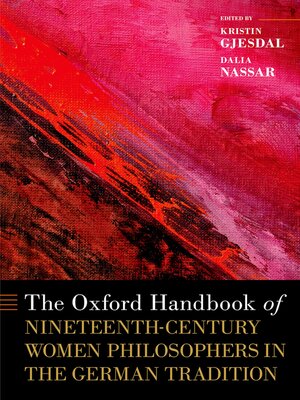The Oxford Handbook of Nineteenth-Century Women Philosophers in the German Tradition
ebook ∣ Oxford Handbooks
By Kristin Gjesdal

Sign up to save your library
With an OverDrive account, you can save your favorite libraries for at-a-glance information about availability. Find out more about OverDrive accounts.
Find this title in Libby, the library reading app by OverDrive.



Search for a digital library with this title
Title found at these libraries:
| Library Name | Distance |
|---|---|
| Loading... |
This Oxford Handbook engages with the work of women philosophers spanning the long nineteenth century in the German tradition. It investigates women's contributions to key philosophical areas such as epistemology and metaphysics, aesthetics, ethics, social and political philosophy, ecology, education, and the philosophy of nature and examines their role in the formation and development of major philosophical moments, including romanticism and idealism, socialism, Marxism, Nietzscheanism, feminism, phenomenology, and neo-Kantianism. Through thirty-one newly commissioned chapters, the volume explores how women often took philosophical premises and positions in innovative and radical directions, and thereby sheds new light on the major movements of the period and their continuing philosophical potential. As the contributors demonstrate, women were generally excluded from academic discourse and therefore had to seek alternative means by which to carry out their philosophical research — often by bringing philosophy to a wider public, and allowing fundamental existential, social, and political questions to determine their philosophizing. By investigating the works, influence, and legacy of a number of understudied and overlooked philosophers, the Handbook contributes to the ongoing effort to revise our knowledge of the history of philosophy, deepen our grasp of the philosophical potential of various arguments, positions, and movements, and critically rethink the narratives by which the discipline understands itself. This volume will serve as a crucial addition to our understanding of nineteenth-century philosophy and the movements that made it up.







